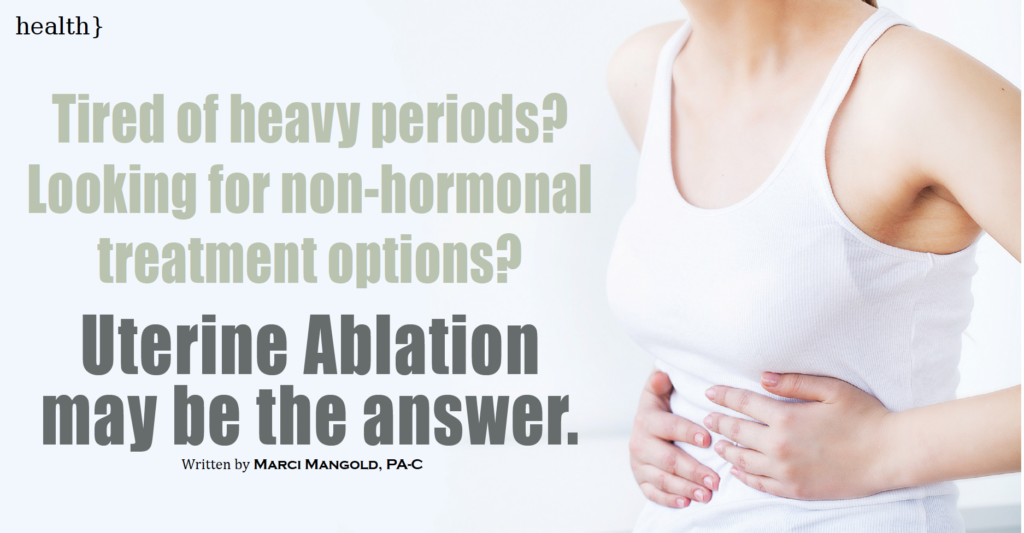Tired of heavy periods? Uterine Ablation May Be The Answer
Written by Marci Mangold, PA-C / Original Article published: 406 Woman Magazine
Do you dread that certain “time of the month?” Feel like you’re preparing for battle, stock-piling supplies before the bleeding starts, or maybe “Aunt Flo” just comes on a little too strong and is more than you can handle any longer? Be encouraged to know you are not alone and there is something you can do about it! Regardless of age, menstrual bleeding that is so heavy that it interferes with your daily life is never normal. During your period you should be able to live life as usual, without missing work or school, avoiding going out in public, or skipping activities you enjoy. Furthermore, according to the Cleveland Clinic, heavy periods are common and affect 27% to 54% of menstruating women. Heavy bleeding can be serious and sometimes leads to anemia, which can be life-threatening without treatment.
So, What Is Normal Bleeding?
Normal menstruation parameters:
- Frequency: 24-38 days from first day of last menses to first day of next menses
- Regularity: Shortest and longest cycle varies less than 7 days
- Duration: Less than 8 days of flow
- Flow volume: Light to heavy; tampon/pad should take at least 1 hour to become fully saturated
- Bleeding between cycles: None
If bleeding doesn’t fall within these normal parameters, it is considered abnormal, unless you are perimenopausal, postmenopausal or taking medication that affects menstruation. Furthermore, abnormal bleeding is ABNORMAL and merits a full evaluation by an experienced gynecological provider to properly assess and treat the underlying problem. Abnormal bleeding can be due to uterine and non-uterine causes. Uterine causes include fibroids, polyps and abnormal endometrial growth (benign or cancerous) and a few examples of non-uterine causes include ovulatory dysfunction, hormonal imbalance, bleeding disorders and medication. Although abnormal uterine bleeding is a serious concern that should not be ignored, the causes and treatment options go beyond the scope of this topic.
Moving forward in this article, the focus will be on premenopausal women experiencing regular heavy periods. For them, endometrial ablation may be a treatment option.
Is Ablation Right for Me?
First, women with heavy menstrual flow are evaluated to ensure no underlying pathology exists. Usually, bleeding can be controlled using hormonal medication and examples include: oral contraceptive pill/patch/ring, progesterone arm implant and IUD (intrauterine device). If medical therapy fails, is not well tolerated, or hormonal medications are contraindicated then ablation can be a good option. However, ablation is not a good choice for women following a recent pregnancy or who plan to conceive in the future. Pregnancy is not likely after ablation and if it occurs, the risk of miscarriage and other complications is increased. For this reason, when an ablation is performed, the use of contraception is recommended until after menopause. Furthermore, it is also important to note that ablation should not be performed after menopause. Postmenopausal bleeding is concerning and often indicative of a more serious underlying cause and should be evaluated promptly.
About Endometrial Ablation
The lining of the uterus is called the endometrium; the endometrium is shed each month during a woman’s menses or period. Ablation destroys a thin layer of this lining and leads to normal or lighter menstrual flow. According to the American Journal of Obstetrics and Gynecology, 85% of women who have the procedure performed are happy with their results one year later and 40-50% of them report a complete absence of menstruation following the procedure.
Prior to the procedure, a sample of the uterine lining is biopsied to ensure there is no underlying disorder of the endometrium like overgrowth, infection, or cancer. Sometimes it is necessary to have a pelvic ultrasound or hysteroscopy (a procedure using a small camera to view the inside of the uterus) to rule out underlying disorders. Once all contraindications are ruled out, an ablation can be performed.
According to the American Journal of Obstetrics and Gynecology, 85% of women who have the procedure performed are happy with their results one year later and 40-50% of them report complete absence of menstruation following the procedure.
Endometrial Ablation Procedure
Endometrial ablation is a short outpatient procedure that can be performed in the office surgical suite or in the hospital. Patients do not typically require general anesthesia and IV medications are sufficient. The cervix is then dilated, or opened, using medication and/or instrumentation and ablation is performed. Several methods are used to perform ablation and include the following:
1. Radiofrequency uses a probe and mesh-like device to send energy and heat into the lining while suction is applied to remove the destroyed tissue.
2. Freezing uses a probe to freeze and destroy the lining while using ultrasound to guide the procedure.
3. Using a hysteroscope, fluid is inserted into the uterus, heated and left for 10 minutes, destroying the endometrium.
4. Using a hysteroscope, a balloon is inserted into the uterus and filled up with heated fluid, which causes expansion until the balloon edges touch the endometrium, destroying it.
5. Microwave uses a probe to apply energy to the uterine lining, which destroys the endometrium.
6. Electrosurgery uses a resectoscope with an electrical tip (wire loop, roller-ball or spiked ball) that destroys the lining. This procedure is performed in the operating room, requires general anesthesia and is less common.
After the procedure, it is common to experience a few minor symptoms such as nausea, frequent urination (24 hours), mild cramping (1-2 days) or thin watery discharge mixed with blood (a few weeks). Furthermore, it is advisable to wait 2-4 weeks before resuming heavy exercise, having intercourse or using tampons. Patients should also avoid soaking in a tub or swimming for 2 weeks in order to prevent bacteria in the water from entering the uterus. Usually, patients can return to regular activities within 1-2 days.
In closing, uterine ablation is a good option to treat heavy bleeding in pre-menopausal women who do not wish to become pregnant and have no underlying uterine pathology. All procedures have associated risks, which should be discussed with the provider beforehand. Kalispell OB/GYN is happy to announce the ability to do certain cases of endometrial ablation in the office. Come see one of the providers at Kalispell OB/GYN for more information.

